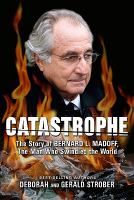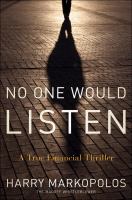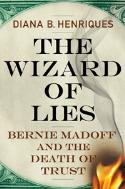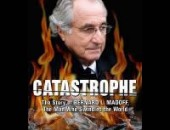The Madoff scandal has spawned a sub-genre of work. In the Toronto Public Library system, there are about twenty entries (books, e-books, DVDs) as of September 2012. It’s already a crowded arena. The books range from those written by victims (The Bag Lady Papers : The Priceless Experience Of Losing It All by Alexandra Penney, 2010) to those written by family (The End Of Normal : A Wife’s Anguish, A Widow’s New Life by Stephanie Madoff Mack, 2011) to those written by persons involved with hunting him down (No One Would Listen, by Harry Markopolos, 2010). Only one mistress has stepped forward thus far (Madoff’s Other Secret : Love, Money, Bernie, And Me by Sheryl L. Weinstein, 2009).
 I attended a talk by Markopolos at the CFA Society Toronto in September 2010 and was spurred on to order his book for review (which appeared in The Analyst, December 2010). While waiting for Markopolos’ book, I delved into my first Madoff book, Catastrophe : The Story Of Bernard L. Madoff, The Man Who Swindled The World, by Deborah Strober and Gerald Strober, 2009. This slim volume seems to have been quickly dashed off to capitalize on the Madoff scandal. The Strobers’ interviewees comment on Madoff’s golf game but do not get down to brass tacks. The book estimates the damage from Madoff at $50 billion, not the $63 billion which is the later consensus. The best part of the book is the inclusion of the Markopolos filing to the SEC re: his 30 “red flags” as an Appendix (yet only 29 are reprinted here – in the rush to publish, it seems a flag was forgotten).
I attended a talk by Markopolos at the CFA Society Toronto in September 2010 and was spurred on to order his book for review (which appeared in The Analyst, December 2010). While waiting for Markopolos’ book, I delved into my first Madoff book, Catastrophe : The Story Of Bernard L. Madoff, The Man Who Swindled The World, by Deborah Strober and Gerald Strober, 2009. This slim volume seems to have been quickly dashed off to capitalize on the Madoff scandal. The Strobers’ interviewees comment on Madoff’s golf game but do not get down to brass tacks. The book estimates the damage from Madoff at $50 billion, not the $63 billion which is the later consensus. The best part of the book is the inclusion of the Markopolos filing to the SEC re: his 30 “red flags” as an Appendix (yet only 29 are reprinted here – in the rush to publish, it seems a flag was forgotten).
 The Markopolos book, No One Would Listen, proved to be worth the wait. It’s a compelling read because Markopolos knows how to spin a good tale. He’d heard for years about a fund with an extraordinarily consistent one percent a month return and spent many hours trying to replicate his competitor’s strategy. Eventually he quit his day job to investigate fraud cases full-time. Markopolos reported Madoff to the SEC five times over nine years. The complaints were either ignored or resulted in trivial changes, hence the embittered title of the book. The most damning evidence was the aforementioned 2005 submission to the SEC with 30 red flags about the Madoff operation. Even after he discovered and documented the fraud, Markopolos could not get the SEC to take action. Reading between the lines, the reader wonders “was it truly SEC incompetence?” Or was it the case that (how to put this diplomatically) Markopolos rubbed everyone the wrong way?
The Markopolos book, No One Would Listen, proved to be worth the wait. It’s a compelling read because Markopolos knows how to spin a good tale. He’d heard for years about a fund with an extraordinarily consistent one percent a month return and spent many hours trying to replicate his competitor’s strategy. Eventually he quit his day job to investigate fraud cases full-time. Markopolos reported Madoff to the SEC five times over nine years. The complaints were either ignored or resulted in trivial changes, hence the embittered title of the book. The most damning evidence was the aforementioned 2005 submission to the SEC with 30 red flags about the Madoff operation. Even after he discovered and documented the fraud, Markopolos could not get the SEC to take action. Reading between the lines, the reader wonders “was it truly SEC incompetence?” Or was it the case that (how to put this diplomatically) Markopolos rubbed everyone the wrong way?
When I received notice of the appearance of The Wizard of Lies: Bernie Madoff and the Death of Trust by Diana B. Henriques (2011) I cheered. Henriques is a respected New York Times financial writer. Surely someone would set the record straight. I expected context, solid notes, and most of all, some perspective. I got all three and a half-decent index to boot (and yes, the Madoff mistress merits two entries).
Wizard of Lies was as compelling read as No One Would Listen, although it is name-dense, which is mitigated by a helpful “Cast of Characters” section. Near the middle of this book is a fascinating chapter titled, “A Near-Death Experience,” that describes the in-depth examination of Madoff’s operations in 2005-2006. Henriques writes, “what happened to Markopolos’s third submission to the SEC is a textbook lesson in bureaucratic bungling.” Attentions from the SEC were affecting Madoff’s liquidity from late 2005 to early 2006, yet the firm survived. It may be this near-disaster which emboldened Fairfield Greenwich (Madoff’s firm).
 Another fascinating chapter is “The Year of Living Dangerously.” This covers the period December 2007 until the revelation of Madoff’s fraud exactly a year later. Henriques pulls out certain dates—such as the Lehman Brothers bankruptcy occurring in September 2008 and gives the reader a sense of what was happening at Fairfield Greenwich Group and the Madoff household at that time. (Example: the post-Lehman e-mail sent to reassure FGG clients is “a half-truth based on a lie wrapped in a mistake.”)
Another fascinating chapter is “The Year of Living Dangerously.” This covers the period December 2007 until the revelation of Madoff’s fraud exactly a year later. Henriques pulls out certain dates—such as the Lehman Brothers bankruptcy occurring in September 2008 and gives the reader a sense of what was happening at Fairfield Greenwich Group and the Madoff household at that time. (Example: the post-Lehman e-mail sent to reassure FGG clients is “a half-truth based on a lie wrapped in a mistake.”)
I object to the sub-title of this book. “The Death of Trust”? Come on, that hyperbolic phrase could have been used for a biography of Mr. Carlos Ponzi himself, and it would have been neither more nor less true. Modern society requires trust to function—I ‘trust’ that the car speeding at right angles to my own will obey the traffic light; I ‘trust’ that my bank account has the money I’ve deposited, even though I’ve never seen the physical pile of cash. Trust has not died. Only trust in a certain type of never-fail investment funds has faltered and even that is only for a while. We must accept that, as humans, we have a need to trust in order to function in modern society; we must learn to channel it properly.
Henriques spent time with Madoff, describes him acutely for the reader, and emphasizes time and again: “he is just like us.” It’s disconcerting to know this… and to know we have a tendency to trust. Can the author tell us how to break the cycle?
Henriques writes in the Epilogue: “The Madoff lesson is crystal clear: The ‘full disclosure’ regime that had been generating fine print for investors for more than seventy-five years didn’t work—and not just because the SEC failed to act on the credible tips it received. It didn’t work because it doesn’t reflect the way today’s investors make their decisions.”
The Wizard of Lies concludes with a radical suggestion: “…maybe the answer is to require individual investors to be licensed, the way drivers are licensed—after they’ve passed tests on all the basic rules of the road. They could be quizzed on how to recognize a fraud, how to choose the best investment out of a multiple-choice test, and how to pick the Ponzi schemer out of a lineup. Running a do-it-yourself pension fund… is far more difficult than driving a car, so perhaps we should make investors study and pass a test before they steer their life savings off a cliff.”ª
For more information on these books, visit the web sites:
Catastrophe : the story of Bernard L. Madoff, the man who swindled the world http://phoenixbooksandaudio.com/books/detail/catastrophe/
No One Would Listen: A True Financial Thriller http://lp.wileypub.com/Markopolos/
The Wizard of Lies: Bernie Madoff and the Death of Trust http://books.google.ca/books/about/The_Wizard_of_Lies.html?id=Nndr6gDhn9oC

